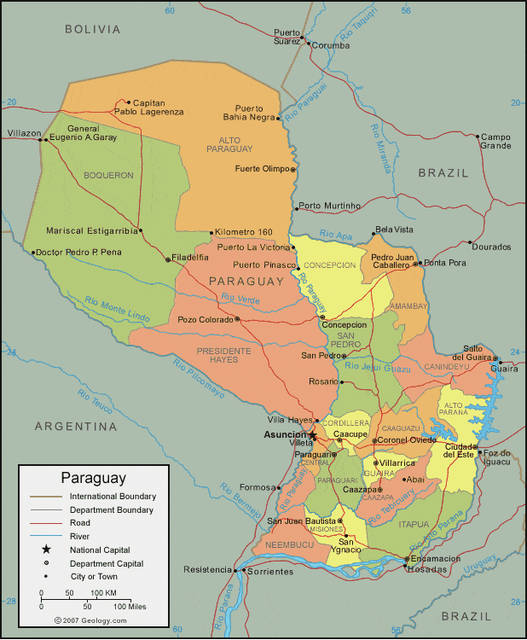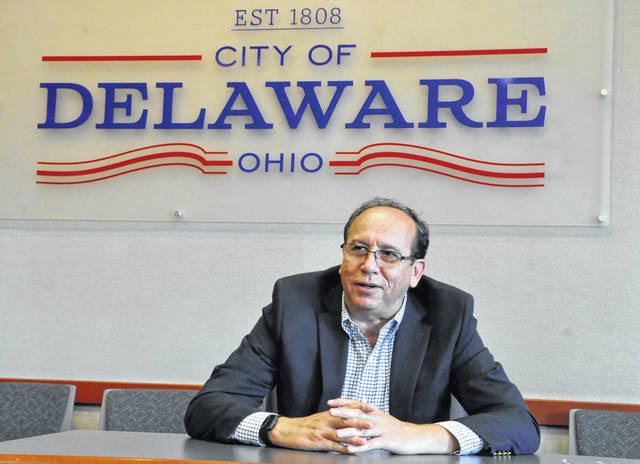

Among those on hand to see the unveiling of the new Rutherford B. Hayes statue in downtown Delaware Friday was an ambassador from Paraguay.
“You say Hayes, but we call him ‘A-yez’ because in Spanish, the H is silent,” said Manuel Maria Caceres, ambassador of Paraguay to the United States. Caceres spoke to the media in Delaware City Council Chambers inside City Hall on Thursday. “For us, (Hayes) is someone who is very important for our history, our path, and for what our country is. A lot of that is not known here.”
While Hayes is a hometown hero here in Delaware, in the nation of Paraguay, he’s a household name. The 19th president of the United States has an entire state in Paraguay named “Presidente Hayes,” whose capital is called “Villa Hayes,” or Hayesville.
That’s not all — Nov. 12 is a provincial holiday in Presidente Hayes. There’s also a Villa Hayes Elementary School with its own bust of Hayes, a soccer team named after him, and a Paraguayan stamp issued in his honor.
Why all the fuss from a small country in another continent for an American president whose single term is considered unremarkable by most historians, and who is not ranked as among the best U.S. leaders? The answer is a decision that had international implications that last to this day.
There was a conflict in South America called the Triple Alliance War that ran from 1864 to 1870 between Argentina, Brazil, Paraguay and Uruguay. Paraguay got the worst of it, losing the most land and casualties — 60 percent of both, according to some accounts. Separate peace agreements had been signed among the combatants; but in 1878, there remained a dispute over a region of land called the Chaco, which was being claimed by Argentina.
“That war was a big tragedy for Paraguay,” Caceres said, decimating the once-prosperous country.
Caceres said Paraguay today is roughly the size of California (230,000 square miles), and the disputed territory was the size of Ohio, about 40,000 square miles. Caceres compared the Chaco region physically to Texas in the United States, with its chief enterprise being cattle ranching. Small industries are wanted by the young population to join hydroelectricity and agribusiness as its giants in commerce. Caceres also said the countries of Paraguay, Argentina, and Brazil are now partners in many ways.
Back to 1878. The two sides asked then-President Hayes to arbitrate in the matter. Although there was no United Nations or World Court in those days, the United States was respected enough as a neutral third party to hear the claims of representatives from each side and settle the dispute. On Nov. 12, 1878, Hayes rendered his decision.
“Be it known that I, Rutherford B. Hayes, President of the United States of America, having duly considered the said statements and the said exhibits, do hereby determine that the said Republic of Paraguay is legally and justly entitled to the said territory between the Pilcomayo and the Verde rivers, and to the Villa Occidentals situated therein.”
Caceres called Hayes “an honest broker” and a “statesman,” which accounts for his popularity in Paraguay: “He is admired by us and is a hero. He left a big impact on a place in the world that was very unknown at the time. President Hayes delivered in a very big way.”
In the book “100 Days in the Life of Rutherford Hayes,” author Eric Ebinger praises the arbitration.
“Due to the fact that the nation of Paraguay was almost completely destroyed during the war, and were still digging out from the destruction, Hayes sympathized … and awarded the land to Paraguay,” Ebinger writes. “The Nobel Prize for Peace would not begin to be awarded until 1901, but Rutherford Hayes would have deserved it.”
Others have not been as favorable in their assessment.
A 2014 National Public Radio segment titled “The Place Where Rutherford B. Hayes Is A Really Big Deal,” suggests State Department staff may have briefed Hayes on the situation before he made his decision. And in 2018, the Mental Floss article “Rutherford B. Hayes, National Hero of Paraguay,” stated Hayes has received more credit than he may deserve for “a matter that may have occupied just a couple of hours of his life.”
However, given his extensive public career as a reformer and abolitionist, it would not be surprising if Hayes gave the arbitration in Latin America his full attention and careful consideration.
For the director of the Villa Hayes Museum, the issue is decided.
“Hayes is a giant, he is a spectacular, immortal figure for us,” said Maria Teresa Garozzo in the NPR piece. “We are Paraguay because of him. Hayes will never be forgotten.”
Interestingly, Villa Hayes already has a sister city relationship with Fremont, Ohio, the city where Hayes spent his final years and is buried. Career diplomat Caceres joked that decision was made before he became ambassador.
In addition to recognizing Hayes on his first trip to the city of Delaware, Caceres said he was getting a tour of the industrial park, and there are talks about economic development and educational opportunities between Paraguay and Delaware to improve investment and be part of the global economy.
“We are very honored to be here in the great state of Ohio and be part of this. It’s good to be invited by the Mayor (Carolyn Riggle) and her team,” Caceres said. “I am very impressed by what I’ve seen, very friendly. For us, it’s an important place, and President Hayes is a big part of it. It’s a way to bring our countries closer together through the memory of President Hayes.”



